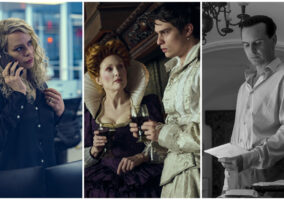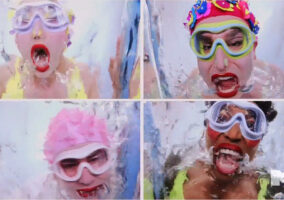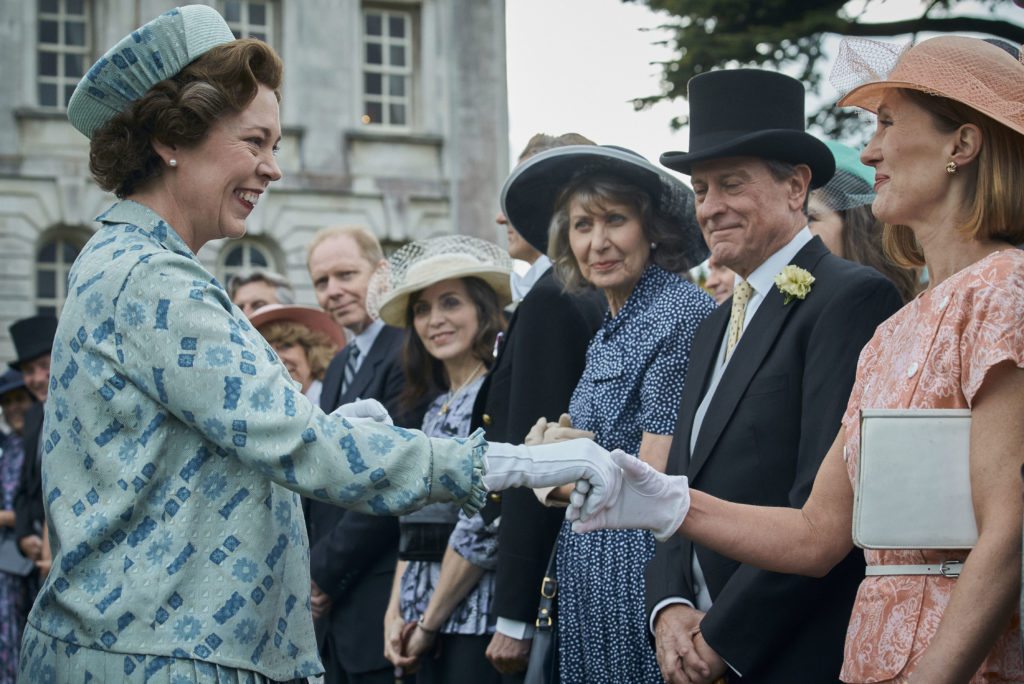
In “Fagan,” The Crown takes a vacation from all the royal drama to spend time with the ultimate outsider while underlining and reaffirming the philosophy that informs the entire series: the personal and the political are one and the same.
The story of Michael Fagan, the Buckingham Palace intruder who spent a half-hour in 1982 chatting with the Queen in her bedroom, is one that begs to be mined for dramatic potential because it’s an inherently dramatic situation and because without any reliable details of exactly what went down, a writer could make the story into anything they wanted. Peter Morgan is now on his fourth season of hammering home the idea that history and personal drama exist in the same narrative space, so we probably shouldn’t have been so pleasantly surprised that he married that concept to Fagan’s circumstances. We’re so used to seeing the foibles and choices of Prime Ministers and princes being the focus of the story, but The Crown has checked in with the normies of Great Britain now and then, usually to give us insight into how the average person of the time viewed the royal family. The reason it worked so well this time is because Michael Fagan wasn’t particularly interested in The Queen. She was simply the last person he could go to in order to voice his complaints about life under Margaret Thatcher.
Which isn’t to say the story wasn’t about the Queen in some respects. This was a tightly written hour of television that managed to work in a whole lot about life under Thatcherism as a member of the working class, but it also had quite a bit to say about the show’s ostensible lead character and gave Olivia Colman the chance to produce some of her best moments in the role. Elizabeth is unnerved by Thatcher’s growing popularity with the public in the wake of the successful Falklands campaign and her seeming enjoyment of the trappings of power. Since the Queen didn’t seem to have this particular problem with other prime ministers, there’s some sense that she feels in danger of being supplanted by a woman wielding power, as if There Can Be Only One. We can understand if some would find that particular angle a little sexist on Morgan’s part; turning a complicated political relationship into a catfight, but Elizabeth literally believes that there can be only one person with her role. She’s spent most of the series slapping back her sister, husband, and heir whenever they tried to take a little power for themselves. And while she comes from a generation that considers powerful men to be the natural course of things, we think it’s interesting to explore the idea that she was uniquely threatened by Thatcher because of her gender. That final shot of Thatcher giving a distinctly royal wave to the cheering victory parade crowd was ominous, seen through Elizabeth’s eyes. This growing mistrust is also used to explain why the palace didn’t take precautions after the first break-in. Elizabeth more or less implied that she feared Thatcher would keep them imprisoned. Silly, yes. But impressively tight writing nonetheless. We just wish Morgan could’ve kept things similarly cohesive and restrained when it came to the dialogue. More on that in a second.
In addition, the whole family comes in for some light mocking regarding their delusions that they have any idea at all what regular people are like. Elizabeth makes a passing reference to Lord Altrincham, the man who publicly criticized them for their walled-off natures in season 2’s “Marionettes,” and we’re struck once again by how well the show manages to pull together all these different events to tell a cohesive, if fictional story about the family. But as we saw during their garden party meet-and-greet, it doesn’t seem like they’ve really learned any long-term lessons about approachability. They pull on their gloves to ensure they don’t touch the so-called “normal people (who are all dressed in pseudo-royal drag for the occasion) and beg to be reassured that they won’t have to have “actual conversation” with any of them even as they pat themselves on the back for possessing an understanding they clearly don’t have. Royal delusion is one of the major themes of the season, it seems.
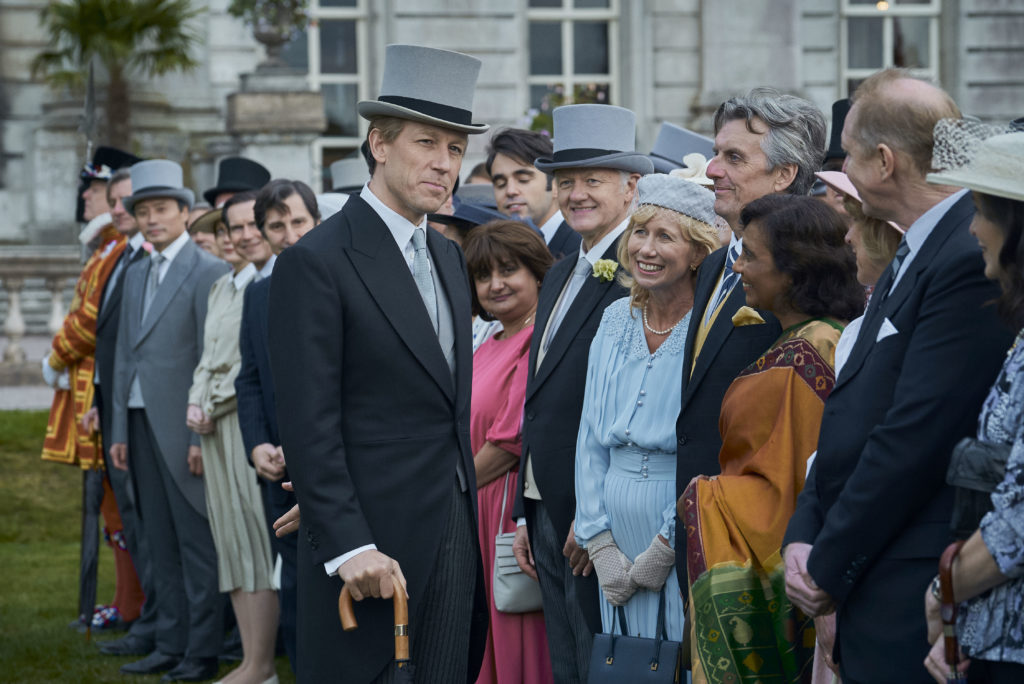
As for Thatcher, we think it’s safe to say at this point that her every appearance so far has come with a critique built in. As odd as some of Gillian Anderson’s choices may be, she’s giving a riveting performance of an immovable woman who simply cannot and will not be talked out of anything she believes. But it was her offscreen performance that had the most impact this episode, as her voice droned on and on in the background of poor Michael Fagan’s “Twenty-eight beige” of a life. Directed by Paul Whittington, the episode serves as a vividsnapshot of life in Great Britain in the early ’80s, for a good deal of its population. Punctuated with snippets of ska and BritPop, we follow Michael through the unemployment line, at temporary jobs, brawling in the pub and the street and lying about his crumbling flat while on and on in the background, Margaret Thatcher preaches her bootstrap gospel. Tom Brooke gives a wonderfully sad/angry performance that endears him to the audience even as he’s being, in his words, a twat a good deal of the time. It’s especially notable because he’s an unknown character more or less taking over the entire episode and doing long scenes alone without any dialogue.
Still, his character truly came alive in his brief interaction with the Queen. Both actors were in fine form. Colman has finally settled into the “Elizabeth Regina” mode that seems to elude her some times; that sense of haughtiness and remove that she has admitted doesn’t come easy to her as an actress (and that Claire Foy was particularly good at). She seems offended by Fagan’s suggestion that she doesn’t care about the people and doesn’t understand their problems. This is where Morgan’s writing tends to lose any suggestion of subtlety, spelling out what earlier scenes had already depicted: “I meet normal people all the time.” “No, you don’t. Everyone you meet’s on best behavior. Bowing and scraping, that’s not normal.” “That’s the thing about this place. It’s even posher than you think and yet more rundown.” As we used to say back in the Mad Men days, they should make the actors stand under a neon sign that says “THEMES” when they deliver lines like that. We spend a good thirty minutes seeing all of the ways in which Michael Fagan’s life sucks; all of the humiliations and degradations of his existence with Margaret Thatcher’s voice droning on in the background, explaining why all the pain would be good for him in the long run. We absolutely didn’t need him to come into the Queen’s bedroom with charts and figures outlining an articulately reasoned critique of Thatcherism. “She has an appetite for power that is presidential and in this country, a president and a head of state cannot coexist!” This does not seem like a likely sentence for this person to utter in this situation, even if it does accomplish the task of voicing Elizabeth’s own concerns, tying the themes of the episode together, and foreshadowing coming conflicts. As we said, the writing’s impressive in its tightness and cohesion. But Morgan doesn’t seem to trust it enough to get his point across sometimes.
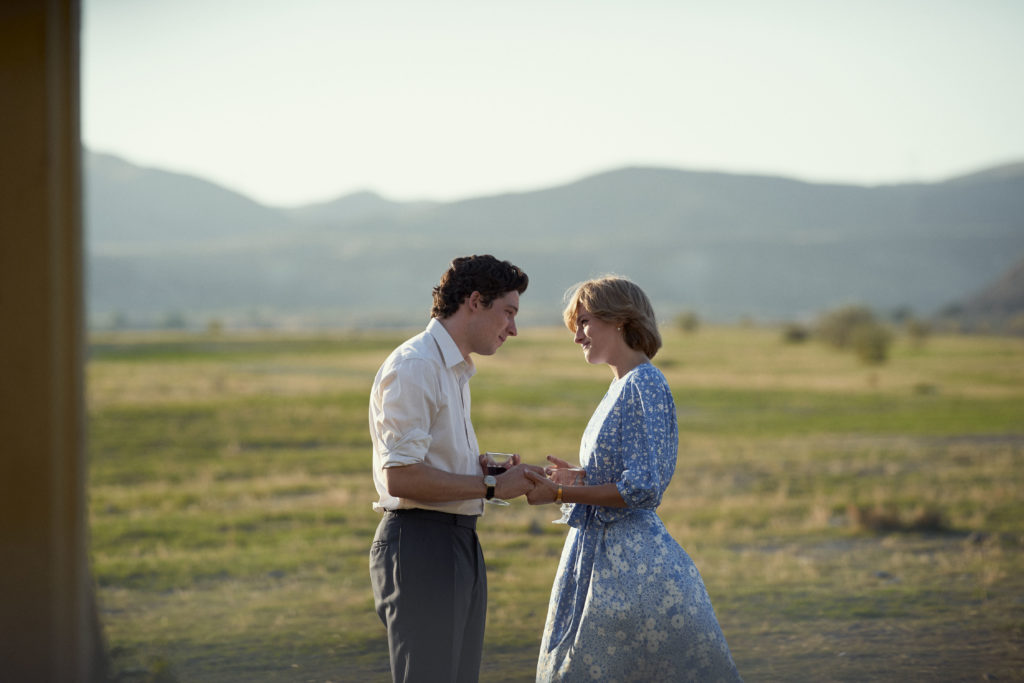
In “Terra Nullius,” we revisit some of the highest highs of the Wales marriage, while showing its uglier and more delusional sides as well. It is to Morgan’s credit that at no point in the story does the Charles and Diana relationship truly feel like a love story, even when they’re declaring their love for each other.
The semi-triumphant yet simultaneously ill-fated 1982 Wales tour of Australia is the framework used to spell out practically every problem the marriage faced or will face going forward. There’s no way to get into the nitty-gritty of their mess of a union without getting a little ugly and The Crown doesn’t shy away from it. Josh O’Connor has done some amazing work this season, turning the formerly sympathetic prince he played last season into an occasional monster of a human being while never losing sight of the core of the character. In the wrong hands, a portrayal like this could feel like a sudden heel turn, but the groundwork had been laid for several seasons and O’Connor is extremely good, so it all feels like a culmination of inevitabilities. The social awkwardness that came off vulnerable and charming when he was taking Welsh lessons last season now comes off boorish and excruciating. Or are we the only ones who found that scene of Charles and Camilla entertaining their horsey set of friends (including Andrew Parker-Bowles) to be completely awful? Like the Ibble Dibble scene earlier this season, or the time Diana got the order of address in the family wrong, or the horrifying lunches with the four miserable royal children, it feels like The Crown has finally embraced the idea that this particular group of people can be kind of awful to be around.
We also tend to think it’s both brave and correct for the show to look at Diana in a harsher light than her myths or hagiographies ever allowed. Some may find her depiction this episode problematic, but we think Morgan’s been absolutely dead-on in depicting a Diana who was victimized by the family but was also an extremely difficult and challenging person in a lot of ways. The Windsor women have another lunch scene to spout exposition about Diana. This slightly Golden Girls/Sex and the City-esque conceit has popped up a few times this season and we don’t really mind it, since the series has not always been great about giving the women characters more of a voice. Princess Margaret informs them that Diana is “wretched in the marriage” and “doing things to herself.” Colman gives us a wonderful moment where it’s clear The Queen’s mind has momentarily shut down while trying to comprehend bulimia. Elizabeth simply has no capacity within her to understand self-harm or an eating disorder and Colman gets this across without a word. Elizabeth’s poor mothering skills come in for another mention, as she and the Queen Mother express exasperation that Diana would insist on bringing the infant Prince William along. Anne is strangely quiet when Margaret asks if Elizabeth’s insistence on leaving the children home during lengthy tours might have had “consequences,” but it seems to fly right over her head as she declares her own tour of Australia in 1954 (depicted in the season 1 episode “Pride and Joy” and not nearly as smoothly professional as she’s remembering it, since she needed injections for facial spasms and was filmed throwing a plate at her husband) to have been “a triumph.”
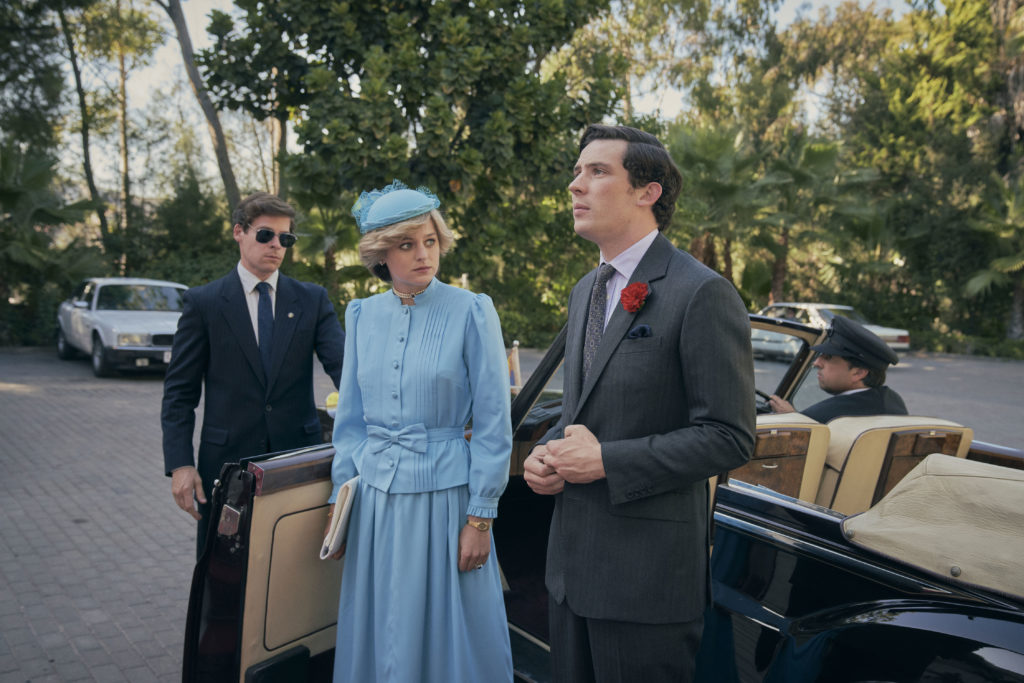
Later, Elizabeth sneers at the news that Diana clung to William on the tour “like a life raft,” which Anne pointedly counters as the reason people respond so much to her. Corrin and the episode’s director Julian Jarrold do a pretty spectacular job of conveying how charming Diana could be when she really wanted to turn it on, but they also didn’t shy away from making her seem like an awful lot to handle behind the scenes. Regardless of whether it was fair to expect the mother of a newborn to leave her child for weeks at a time, Diana’s excruciating dressing down of Charles’ private secretary, where she refuses to call him by his name, insults his character and insists that he dub her extremely privileged child “perfect” made no bones about what the People’s Princess could be like when the cameras were off and she was feeling threatened – which was, to be fair, how she felt the entire time she was married. While it’s not stated here, Diana suffered from crippling postpartum depression. There’s no good way to have any character express that information to the audience, however (even she didn’t realize it until years later and no one around her had the capability to see it for what it was), so some of her tirades, while a fair depiction, don’t give the full picture as well as they could have.
After Diana has a screaming match with Charles’ private secretary, she insists on being reunited with William and the not-so-happy family get a respite from the tour as they reconcile at a remotely picturesque sheep station. As one does. Charles and Diana have a frank discussion about their marriage, which turns into an enormous fight about their marriage, which turns into a tearful reconciliation and declaration of love. All in the space of five minutes. It’s all set up and knocked down: Diana’s eating disorder, Charles’ unfaithfulness, they’re shared desperate need for constant validation. They’re like two open wounds, unable to heal and aching for someone else to do it for them. The sudden turn from screaming to gushing to each other about how gorgeous they are is not played as some sort of romantic breakthrough. Instead, it comes off sadly delusional. She says he’s the “cleverest, handsomest man in any room” and he says he’s the luckiest man in the world to be married to her. Even if we didn’t know how it all turned out, it would still feel tragically forced and desperate.
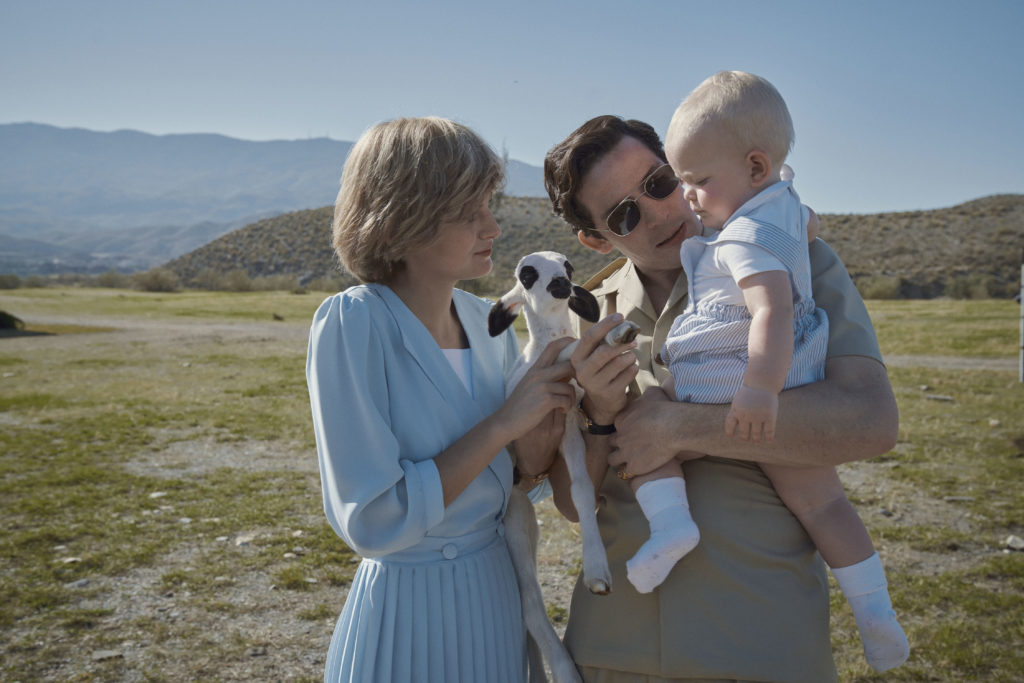
After their feverish promises and declarations, the tour explodes, the crowds come out, they’re ecstatic and charmed, Charles and Diana dance and share a bedroom, he refuses to return Camilla’s calls. They’re like a couple of addicts on a sobriety high because they managed to go a few days without giving in. You can see Diana becoming the Diana of memory, the image of Diana, the icon. Corrin is wonderful in the scenes interacting with the crowd and the press, getting Diana’s persona, body language and speech exactly right. O’Connor is perfect as he shows Charles charmed by his wife, perturbed by her and ultimately explosively jealous of her. There was never going to be a route to happiness and love for Diana here. Even when she does everything she’s told and delivers everything expected of her, her husband can only be jealous and enraged in response. She tries to plead her case with her mother-in-law and that goes about as well as you’d expect. What’s so good about these scenes is how they come off so painful to watch. With everything the series has conveyed about Elizabeth over the previous three seasons, any viewer would naturally cringe at the sight of Diana throwing her arms around her and calling her “Mama.” So much of this season plays on the audience’s knowledge to produce these “Oh honey, no” moments. The sense of doom is palpable. And truth be told, it’s partly why the season is so entertaining. These actors are making these moments tragic rather than enraging. Colman is exquisitely nonplussed, cutting the meeting short and practically running away from Diana, the raw open nerve. No one here knows what to do with this “immature little girl,” as the Queen Mother calls her. Margaret, who’s turning out to be quite the voice of the family’s conscience this season, predicts the Princess is heading for a break.
Zendaya Pays Tribute to Icons of the Past for Essence Magazine Next Post:
WERQ From Home: Lily Collins Promotes “Mank” in Saint Laurent
Please review our Community Guidelines before posting a comment. Thank you!


